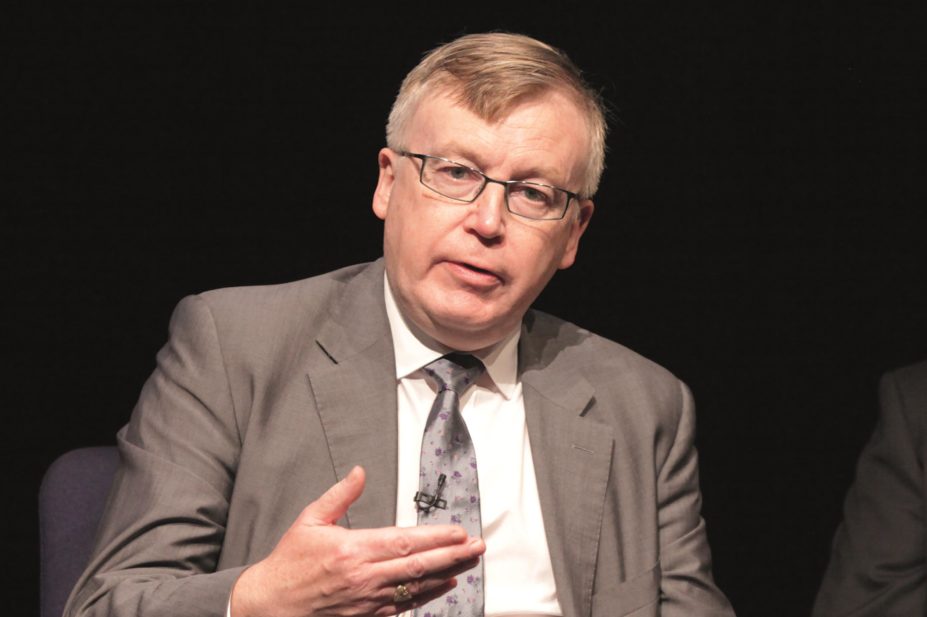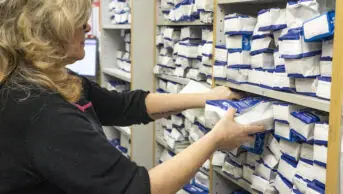
RPS
The pharmacy workforce must embrace clinical practice in the next few years amid advancements in medical and dispensing technologies and the need to improve medicines use and reduce wastage in the NHS, according to the UK’s chief pharmaceutical officers (CPOs).
Demands from the NHS to improve medicines use in hospitals and the community – reducing avoidable medicines-related hospital admissions, drug waste and poor adherence – require a clinical focus from the profession backed up by better use of technology, they said.
England’s CPO Keith Ridge said the expansion of patient care and a focus on medicines optimisation are a “dead cert” for the future of pharmacy.
He told the Royal Pharmaceutical Society (RPS) annual conference in Birmingham on 14 September 2015 that large-scale centralised dispensing in community pharmacy was now here. “If implemented well, not only will dispensing be safer and more efficient, but it will free up highly trained staff to work more closely with patients – to deliver clinical pharmacy and medicines optimisation, and help people live healthier lives,” he said.
“Set alongside improved diagnostics, genomics and personalised medicine, we can expect radical change to patient care in the not too distant future,” he said, and described the deployment of clinical pharmacists in GP surgeries as a “real opportunity” for the pharmacy profession.
“Put all that in the context of the new models of care being piloted across England, and it’s easy to see how clinical pharmacy will, and must, quickly dominate pharmacy practice.”
He added: “Some will embrace change more readily than others, and some will be able to adapt more quickly, but throughout we must ensure patients and the public are nothing but beneficiaries.”
Improving medicines optimisation
Mark Timoney, Northern Ireland’s CPO, said his nation needed innovation in medicines use amid the challenges facing its healthcare system. “Our overuse, underuse and misuse of medicines – and the suboptimal outcomes that have resulted through that – have not escaped the attention of our quality improvement authority, and have not escaped our audit office… or our public accounts committee,” he said.
Timoney said a newly developed Medicines Optimisation Quality Framework to minimise variation in care would be rolled out later in 2015. This will help to ensure a regional, consistently delivered service to improve all stages of care that involve medicines. It includes standards for care so patients and carers know what to expect when medicines become part of treatment and will examine gaps in medicines optimisation and ensure that these are closed.
Scotland’s CPO Rose Marie Parr spoke of the changing setting for much of the clinical work pharmacists will be carrying out in future. “Our general direction of travel… [is that] the community hubs, the place where we will see patients, will change and sometimes that may be in their own home.”
She explained how she aims to refresh the ‘Prescription for Excellence’ programme and ensure it is “about pharmaceutical care, not pharmacists”.
Pharmacist career framework needed
Parr said she would work to put pharmacists at the centre of improving medicines safety.
Pharmacy professionalism will be a pillar of her work, she said, as will developing a career framework that better describes what a pharmacist does, to be used by other health professionals, such as GPs who may wish to hire them in their practices.
Parr added that there needs to be a focus on producing a better evidence base and outcomes for pharmaceutical interventions. “How do we get better at describing what we do for patients,” she asked.
Discussing advancements in clinical practice in Wales, CPO Roger Walker said 60 primary care clusters have been competitively bidding for a share of £70m funding to develop local health services, which has also included hiring clinical pharmacists.
“We had 20 pre-existing pharmacists working in GP practices across Wales,” he said. “Since we’ve put the money out there we’ve had successful bids and we’re up to about 50 practice cluster-based pharmacists and I know there’s another 12 or so to be appointed. That’s been a positive step forward.”


